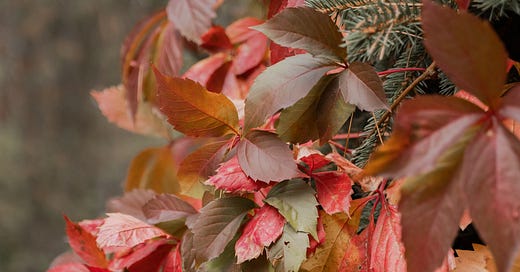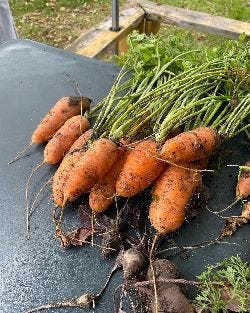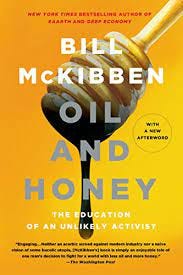Recovering a Seasonal Way of Living
Are you a summer iced cappuccino kind of person, or is it pumpkin spice latte that is your thing? Social media playfully suggests that rather than calling this time of year autumn or the fall, it is, rather pumpkin spice season. This is when we see all things pumpkin spice, from the pies at Thanksgiving to coffee drinks, to pumpkin-spiced Cheerios in the grocery store!
Certainly, this is a beautiful time of year, as the colours of the trees attest in a glorious riot of swirling warm tones. The maple trees on the walk to and from my daughter’s school are absolutely luminous; I love to stand right under them and look up, up, up. My vision blurs until the leaves are no longer distinct from one another, but rather merge and move in a way that suggests that the tree knows of its particular beauty at this time of year. The tree seems to know that yes, its leaves are dying and it is moving into a time of deep sleep for the winter, and yes, that tree is going to celebrate the shortening of the days and the coming of the dark, and the slow time that winter is meant to usher in.
We have lost track of what the seasons mean, not only for the non-human parts of the Earth community, but also what they mean for us too, as animals living in the rhythms of the seasons, and cycles of the Earth. With electric light and central heating, capitalist models of work (and play), and the urgency that we have created in our society to do, do, do, and have more, more, more, we have lost track of the fact that, as fall comes and we begin to prepare for winter, just like the trees and the bears, the squirrels and the bees, we too are meant to slow down, to bring in our stores of food, and prepare ourselves for the short days and long nights of winter. No, we do not hibernate like trees, bears, bees, or fish, but if we pay attention to the animals and birds that overwinter here, they slow down. They eat the food they stored away in the fall; they go to sleep when the sun goes down; they rest and wait until the strengthening warmth of the sun returns in the spring. Our earliest ancestors knew this way; they knew to work hard in the spring and summer to create food for the winter; to spend the fall harvesting and preserving that food and putting it away; and planning for quieter activities, shorter days and long, cold (sometimes very cold) nights.
This is not to romanticize how hard it was, before our era of abundance for many, when a bad summer harvest could mean food deprivation in the winter, and a particularly cold winter could be dangerous. Let us remember that, here in this country, so many still struggle with having enough energy and food to stay warm and full in the winter. It is to say, however, that there is wisdom in the ancient ways our human ancestors did things, and wisdom in how our non-human neighbours continue to do things.
In what ways do you need to recover a seasonal way of living? In what ways do you need to slow down, focus on preparing for winter, and then anticipating how the winter season can be a time for shorter days, less activity, more sleep, more play and less work? How can the winter season become a time of rest and restoration for you, a time for your mind and body to go into a quieter mode, and prepare for the dynamic, life-giving energy of the spring season?
Jesus lived fully embodied in the land and seasons of first-century Palestine. He would have known the seasons in his body, and in the rhythms and practices of the community and faith he practiced. How might we, as people of faith, seek to recover the seasonal rhythms of life, and bring them into our spiritual practices and worship lives in our communities of faith?
Announcements
There is still time to register!! Please join me, in person or online, this Nov 4-5. It is free of charge, and sure to be a fun, informative and insightful time of learning and exploration. Go here to find out more and to register.
BLOG POST: As You Sow: A Scripture Reflection on Galatians 6:7-10
Find it here: https://jessicahetherington.ca/blog/
Reading for Transformation
The Christian Consumer: Living Faithfully in a Fragile World, by Laura M. Hartman. Oxford: Oxford University Press, 2011.
This book came out shortly after I finished writing my dissertation, but it proved very helpful to me when teaching courses based upon my research. In my dissertation, I explore what discipleship means and how we can engender the radical reduction in consumption that is needed as a form of Christian discipleship in our time and place. Hartman explores the meaning of consumption and its moral implications, and offers a theological examination of how to understand consumption in the contexts of avoiding sin, embracing creation, loving our neighbour, and keeping the Sabbath. I thoroughly recommend it.
A more recent volume:
Oil and Honey: The Education of an Unlikely Activist, by Bill McKibben. Times Books: 2013.
After reading The Flag, the Cross, and the Station Wagon by Bill McKibben, I decided to pick up this book, too. I found it to be a quick read; like the previous book, McKibben has a highly engaging, readable style. This book juxtaposes his increasing (and unexpected in many ways) activism with the group he founded, 350.org, with his encounters with a beekeeper and his honeybees. I found it helpful to read about someone who was not trained as an organizer or activist, yet found himself in a position of activist leadership. It is a good story of collaboration and cooperation with others, many younger than himself, to put on some of the most important and successful climate actions to date. By going back and forth to the beeyards, both in the timeline and in the book itself, McKibben illustrates the vital importance of grounding ourselves in the beauty and wonder of the Earth community; the reason why he and others do this work. If you are looking for an inspiring read, this is a good choice.
Discipleship in Action
The news about the ecological crisis, especially the climate crisis, can be overwhelming and discouraging; it is easy to feel that there is little we can do. This isn't true! There is so much that we can do, concrete actions that we can take now, in response to God's call upon us as people of faith. Here is one idea.
VOTE!
This Monday, October 24, there will be municipal elections held across the province of Ontario. Some of you have voted in advance polls; some of you may be undecided yet who to vote for (or, like me, you prefer the excitement of voting day); and some of you aren’t sure you really feel like voting. ‘What is the point?’ you might be thinking.
Making change is the point. I know how complicated and imperfect the voting system is (in Ontario, in Canada, and around the world). Sometimes, it seems broken beyond repair. But it is still one of our civic responsibilities as citizens. It is a responsibility that comes with the many privileges of being part of a community. It is my belief that municipal elections (including for school board trustees) are some of the most empowering for us to feel the power that our individual votes can have. We vote, and then we can see, close up in our communities and schools, how those votes are working.
I’ll be honest; we have had a solid city councillor in our ward. This year, I began to do what many of us do; just assume that I would vote for him again. I have been, for the most part, happy with how he has responded to community needs and advocated for our ward at City Council. However, just going with what I am used to is not discipleship. Discipleship demands that I read the platforms, communicate with the candidates where possible, seek out the opinions of people I trust, pray on it, and then make a decision.
I did that in this case (after running into another candidate at the recent climate march, and learning more from him directly). In doing so, by reading the platforms, communicating with some of the candidates, seeking out others’ careful opinions, and praying, I made the decision to vote for someone else, someone with a wealth of experience and who, most importantly for me, has the climate emergency front and centre in his platform. I am currently doing the same discernment for school board trustee.
So, if you haven’t voted yet, I encourage you to undertake the same prayerful process of discernment. And if you have already voted, I’m so glad. Participating in the democratic process is a vital part of building a world of peace, justice, and Earth healing. And finally, if you weren’t sure whether you were going to bother, please get out and vote. The system isn’t perfect, but it will never change if we don’t act.
Our civic responsibility doesn’t end at the polling booth; civic engagement is important throughout the time between elections. But voting is a critical part. Discipleship in action!
Coming Events
Upcoming Talk: “More Than Care for Creation: Responding as Church to the Ecological Crisis”
Presented to the Manitou Intentional Learning Community, Wednesday, October 26, 7:00 pm. Online via Zoom. For more information go to: https://www.manitoulearningcommunity.com/2022/09/17/more-than-care-for-creation-responding-as-church-to-the-ecological-crisis/.










